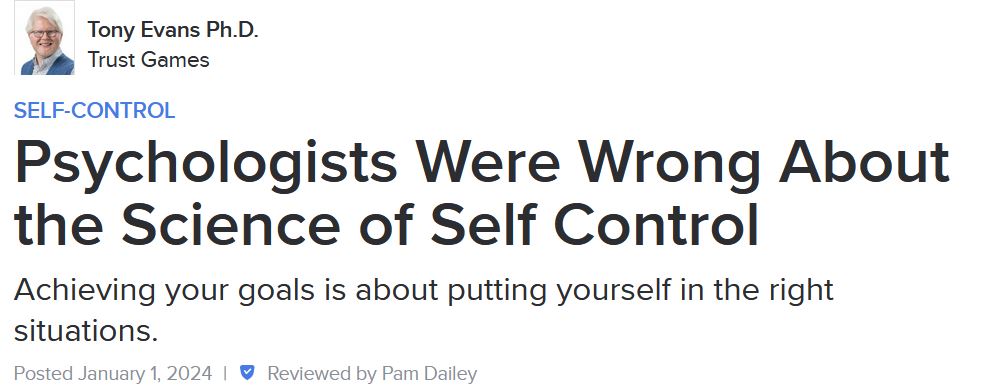

Psychology Today: Wrong about self-control
Why do so many New Years resolutions fail?
Until recently, psychologists believed that self-control—the ability to stick to and ultimately achieve long-term goals—worked like a muscle. Success was about whether you had enough willpower to achieve your goals. But new research suggests that keeping our resolutions depends more on the situations we choose to put ourselves in.
Psychology and other soft sciences shouldn’t get too fond of analogies or their theories. They liked this so much that for decades, tons of papers were written about this explained human nature.
But, in the past few years, researchers have become less confident about this theory. Multiple large-scale experiments failed to find clear support for it (Hagger et al., 2016; Vohs et al., 2021). These experiments, which involved dozens of research teams collecting data and thousands of participants, found that (at the very least) the effects of self-control depletion were much less robust than the previous literature suggested.
A hard science would have done a bunch of large-scale experiments early on, before everyone ran with it.
While psychologists have become less interested in the idea that self-control is a muscle, they are more interested in how it is shaped by the features of situations.
Some situations make it very hard to stick to our resolutions. Consider two people who are trying to spend less money at Starbucks this year. The one who lives across the street from a Starbucks is going to have a much harder time than the one who lives over 30 minutes away from the nearest Starbucks.
I feel like everyone knew this already. If you have a crush on someone you work with, you don’t go on a business trip with that person and you may need to work somewhere else. The military has fraternization rules in place for just that reason.
I have wanted to workout for most of my life. I bought an exercise bike and used it all the time. Mostly to hang towels that were still damp after coming out of the dryer. When I did use it, I allowed myself to watch an episode of Northern Exposure each session. After five years, I hadn’t gotten to the fourth season.
I chose an apartment complex specifically because it had a gym open 24 hours. The equipment wasn’t great, so after eight years, I’d workout a dozen times. I have joined gyms, but didn’t go, a half-dozen times. There was no good excuse.
When I came into some prize money, I tried again. I asked my friend if he’d work out with me at the community rec center if I bought him a membership. He said that he wouldn’t mind giving it a try. I clarified, “If I buy you a membership, your job is to get me to work out at least twice per week for the year.” He agreed, and for the most part, it worked. We were both sabotaged by our engaging conversation. The regular desk attendant was a retired teacher with a curious mind. Jimmy was tough to avoid.
At the end of the year, I asked my friend if he wanted to continue on his own dime. His wife thought it would be better if they joined a nearby Planet Fitness. They did, and for the past five years, they have been members, but neither one have gone in.
In August, when my brother retired, he agreed to join Planet Fitness with me. We committed to working out together three times per week. We’ve missed probably six times. That’s not bad with the holidays and me taking a drive to Fargo.
I call it “tricking your brain”. We can’t control how we feel, but we can control what we do. Use reason to decide what should be done, then implement a scenario that will make it easier for you to follow through, then to bail out. People do this all the time.
If you want to eat clean, don’t go grocery shopping when you are hungry. If you don’t have garbage in the house, you are less likely to go out and buy it when you want it.
If you don’t want to drink so much, don’t go to the bar. If all your friends are at the bar, then schedule other activities with your friends.
If you don’t want to keep checking your phone, then turn it off. Obviously you can turn it back on, but that takes longer. Or leave it behind. Nobody needs to reach you that urgently, you aren’t important enough.
People are supposed to know this, but maybe they don’t. When you are strong, make it more difficult to be weak. Psychologists should do some large-scale experiments on this theory.